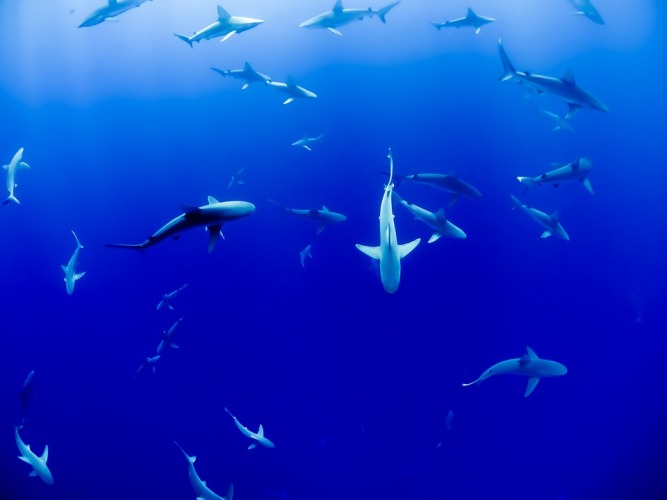Homosapians have inhabited Greece in some form for 40k years.
Society really started to form, however, over 3k years ago and became the birthplace of philosophy, theatre, and a slew of gods and goddesses.
The country of city-states is one of the most well-known in the ancient world.
Home of the Olympics, Heracles (aka Hercules), and five of the ancient wonders of the world, Greece has made a lasting impact on humanity from its humble beginnings.
Speaking of ancient things, the first recorded attack by a sea creature was put into Greek history by Herodotus in 492 BCE.
That could possibly be the first shark attack ever written.
At one point, he wrote that 300 ships had been destroyed and as many as 20k men were eaten by sea monsters.
Later, around 240 BCE, Greek poet Leonidas of Tarentum wrote in detail about a fisherman who was attacked by a sea monster while being pulled onto a boat.
This creature bit into the lower half of the body, splitting the body into pieces.
It is hard to say if this was the handy work of sharks or not since aquatic life has possibly changed over time.
It does bring us to the following question though.
Contents
So… Are There Sharks in Greece?
On the east coast is the Aegean Sea.
It is there that a few sharks have been sighted.
In fact, in the past 170 years, there have been 15 recorded shark attacks.
Only one of those events has led to a death.
Mostly, the sharks that have been seen off the coast are not likely to attack humans.

On the very rare occasions, one is seen, you can rest assured that it is not out to get you.
These types of sharks, for various reasons, are unlikely to attack.
Here are a few of what you could expect to see in the area:
- Thresher – this type of shark has very small teeth and is actually quite shy. Although they are expert hunters, they will avoid any interaction whenever possible. There has actually been only one recorded Thresher attack and that had a lot to do with a person grabbing the shark’s tail.
- Basking – this shark is intimidating because of how wide the mouth gets. He likes to eat his prey whole in one gulp because the teeth are tiny. That means they do not bite, so they will not be biting humans. However, due to that extra largemouth, it might be best to swim away in general.
- Dogfish – are often considered the most abundant shark in the ocean. Dogfish are able to have that distinction in large part because they are so small. Their food is often small fish and krill. They also prefer deep waters, all of which make an attack by this shark very unlikely.
Is it Safe to Swim in Greece?
Even though there have been a few shark sightings, the beaches are some of the most popular in the world.
With the number of locals and tourists alike enjoying both sides of the Greek coast, the beaches are generally deemed very safe.
The tides are as chill as a nap on the sand.
There is really not a whole lot to worry about in these waters.
With that being said, there are still some sea creatures it would not hurt to keep a lookout for.
Here are a few:
- Moray Eel. This slippery guy is most likely in the Mediterranean. In clear water, they can be picked out due to their unique and sometimes colorful body pattern. If you can see them, that is. They prefer hiding spots so they can lunge towards prey for biting. Due to the toxins that they inject upon a bite, you will need to go to the hospital if you find yourself targeted by one.
- Stingray. If you have seen Disney’s Moana, you might see stingrays as magical. They sure are alluring, after all. However, if you do see one, remember this is a creature and keep your distance. They are unlikely to attack you, but if they feel you are encroaching on their spot, they might feel threatened and come after you. Their long tails are barbed and they have sharp fangs. If they decide to attack you, it is going to hurt like nobody’s business. If you accidentally make them agitated and they do attack, go immediately to the hospital to avoid anything needing to be amputated or death.
- Portuguese Man O War. This guy is the cousin of jellyfish. However, it is actually a bunch of tiny organisms that do different things but act like one body. They do sting like jellyfish, though. If you get stung by one, pour as much seawater over the spot as you can. Any leftover tentacles will keep putting venom in your skin. Once you are sure the wound is clear of any remnants, you might want to go to the hospital. A sting can cause severe reactions, even in those who are not allergic.
- Scorpions. These are actually quite common all across Greece. They pack a powerful sting that can knock you over. It is uncommon to get stung if you are able to pay close attention to where you are walking or sitting outdoors. However, if you do get stung, the best thing to do is put ice on it. If you start to feel nauseous or light-headed, get to the hospital.

Interesting Shark Facts in Greece
There are no regular interactions with sharks in Greece, but there are the occasional mishaps where people and sharks or other wild things collide or come a little too close for comfort.
Here are a couple of local stories:
- Karathonas Beach. In April 2021, a blue shark got a little too into the chase for dinner. In shallow water, shockingly close to the shore, a shark was just casually gliding through the water. Luckily, no one was in the water and got caught up in the chase. Blue sharks are known to eat small fish and not humans, so no one but the fish was in harm’s way. He probably did not even realize he was so far out of his comfort zone.
- UFOs. In March 2018, a Greek photographer on his way to Athens saw something quite unusual over the Aegean Sea. While pretty much at eye level with this floating cloud of smoke, the video gets a clear shot of a confusing image. So far, the video has almost a million views with many people wildly speculating as to the object’s origins.
An overwhelming majority of sharks have a particular fondness for saltwater.
There are only a few that can exist in freshwater and they evolved that ability over time.
The reason for this preference is as old as sharks are and it is due to the need for salt.
Without a certain amount, a shark’s cells can explode and cause extreme bloating and death.
As far as temperatures go, it varies depending on the species.
The Great White is built to withstand cold waters but seems to seek out warm water.
On the opposite side of the spectrum, there are sharks like the Greenland sleeper, which thrives in frigid temperatures.
3 Safety Tips for Swiming in Shark-infested Waters
You may not need to worry about running into a shark off the coast of Greece.
Even so, if it happens to you, here are some tips on how to deal with the situation:
Oh no!
The intense water beast is close enough for you to make eye contact.
What is your next move?
Instinct will tell you to swim away as fast as you can in the opposite direction.
This actually tells the shark that you are prey and to hunt you down.
Instead, fight the urge to flee and instead give them the staredown.
Do not let it go on for too long, though.
Once you have established you are also a predator, check the scene carefully for other sharks.
That might make you the calmest person on the planet, but it could really work to your benefit.
Okay, you made eye contact and looked around for more.
It is just you and the shark.
How do you get away?
Slowly and backward.
Do not start moving erratically by splashing or flailing.
Those types of movements signal to the shark that you are injured or sick and that puts you back as a dinner option.
You will want to move anything you have on you toward the direction of the creature.
The push of the water in his direction will likely turn him away from you, giving you an out.
Hopefully, by now the shark is headed out, but if not, notice the behavior.
If you see him opening the mouth or lowering the pectoral fin, do your best to get out of the water as coolly and quickly as possible.

Summary
For the most part, at least in the modern era, sharks ignore humans.
There has been video taken of sharks who were close to people who never knew.
They did not care to get involved with whatever the people were doing.
While there are a handful of sharks in the Aegean Sea that people have come across, a majority of sharks keep as much of a distance as they can.
If anything, there are more scary things to be afraid of in more shallow waters.
Sources
- https://www.americanoceans.org/facts/can-basking-sharks-eat-humans/
- https://oceana.org/marine-life/spiny-dogfish/
- https://www.sharksider.com/10-incredible-facts-thresher-sharks/
- http://www.sharkattacks.com/historical.htm
- https://www.travelandleisure.com/travel-tips/how-to-stay-safe-from-sharks-while-swimming
- https://greekreporter.com/2021/04/28/rare-sight-shark-swimming-shallows-greek-beach/
- https://www.natgeokids.com/uk/discover/history/greece/10-facts-about-the-ancient-greeks/
- https://welovesharks.club/7-of-the-most-common-misconceptions-about-sharks/
Planning a Trip to Greece?
Learn all you need about any safety concerns in Greece.
Greece Safety Overview
READ THE FULL REPORT: Greece Safety Review
Safety Index:
- OVERALL RISK: LOW
- TRANSPORT & TAXIS RISK: LOW
- PICKPOCKETS RISK: MEDIUM
- NATURAL DISASTERS RISK: LOW
- MUGGING RISK: MEDIUM
- TERRORISM RISK: LOW
- SCAMS RISK: MEDIUM
- WOMEN TRAVELERS RISK: LOW
Frequently Asked Questions
Are there any colors to stay away from to avoid sharks?
Yes.
Sharks are colorblind but can differentiate by brightness.
So, it would be wise to avoid light colors and anything neon.
Those would be more likely to catch the attention of a shark and perhaps send him your way, if not just to see what is going on where you are.
Best to stick to darker colors to not stand out.
That includes no shiny jewelry.
Are sharks drawn to human blood?
This is a myth.
The result of a multitude of studies done to determine that exact question has ruled that sharks have no reaction to the scent or blood of a human.
So, no, that paper cut you have on your finger is not going to be your ocean downfall.
Do sharks have to constantly be swimming?
The way the biological system works is that, since they do not have lungs as we do, oxygen has to be processed by going into the bloodstream.
The way they breathe depends on the shark.
Some species find spots where the current is strong and it allows them to rest while the water flows quickly over the gills.
Others use large gulps of water and pump it through slower.
So, rest is possible.












Is there any bull sharks in the waters of Greece?
Bull sharks can swim in fresh water.
Despite the occasional shark sighting in Greece, it’s generally safe to swim here with our beaches being some of the most popular worldwide and sharks rarely posing a threat due to their preference for deep waters.
No, there are no sharks in Greece.